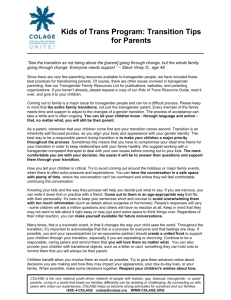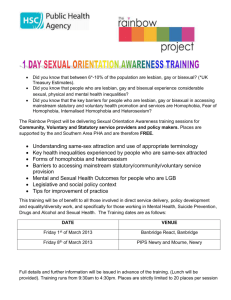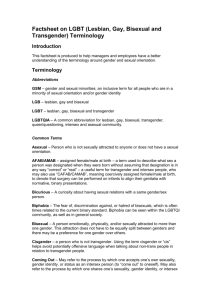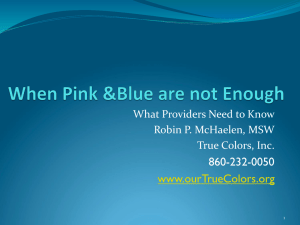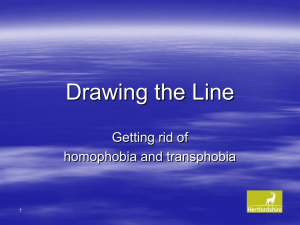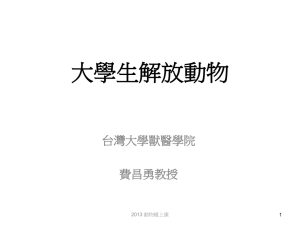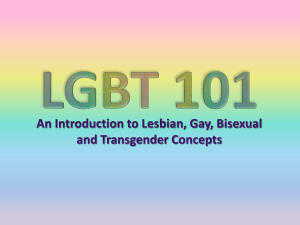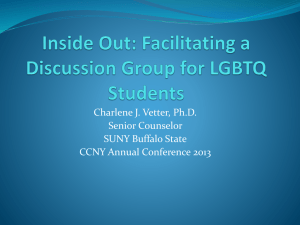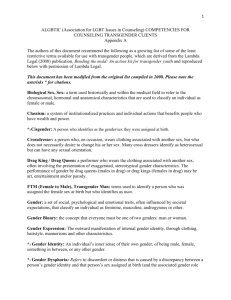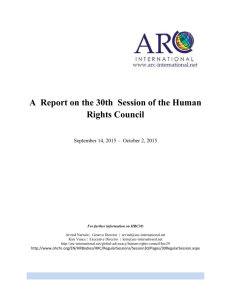Glossary of Terms
advertisement
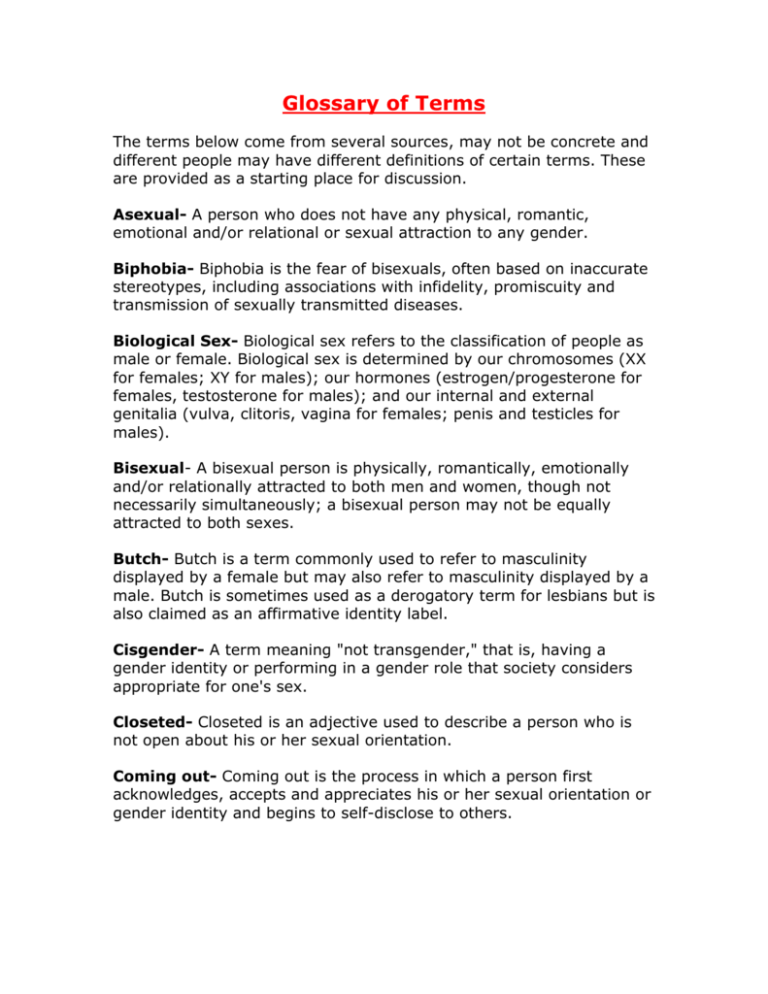
Glossary of Terms The terms below come from several sources, may not be concrete and different people may have different definitions of certain terms. These are provided as a starting place for discussion. Asexual- A person who does not have any physical, romantic, emotional and/or relational or sexual attraction to any gender. Biphobia- Biphobia is the fear of bisexuals, often based on inaccurate stereotypes, including associations with infidelity, promiscuity and transmission of sexually transmitted diseases. Biological Sex- Biological sex refers to the classification of people as male or female. Biological sex is determined by our chromosomes (XX for females; XY for males); our hormones (estrogen/progesterone for females, testosterone for males); and our internal and external genitalia (vulva, clitoris, vagina for females; penis and testicles for males). Bisexual- A bisexual person is physically, romantically, emotionally and/or relationally attracted to both men and women, though not necessarily simultaneously; a bisexual person may not be equally attracted to both sexes. Butch- Butch is a term commonly used to refer to masculinity displayed by a female but may also refer to masculinity displayed by a male. Butch is sometimes used as a derogatory term for lesbians but is also claimed as an affirmative identity label. Cisgender- A term meaning "not transgender," that is, having a gender identity or performing in a gender role that society considers appropriate for one's sex. Closeted- Closeted is an adjective used to describe a person who is not open about his or her sexual orientation. Coming out- Coming out is the process in which a person first acknowledges, accepts and appreciates his or her sexual orientation or gender identity and begins to self-disclose to others. Cross-dresser- A cross-dresser is a person who occasionally wears clothes and/or makeup and accessories traditionally associated with people of a different gender. Cross-dressers are usually comfortable with the sex they were assigned at birth and do not wish to change it. Cultural Competence- Cultural competence is the ability to interact effectively with people of different cultures. Culturally competent organizations should have a defined set of values and principles and demonstrate behaviors, attitudes, policies and structures that enable them to work effectively cross-culturally. D/L or Down Low- Label adopted by some African-American men (and recently, many Latino men) who seek same sex relations, but do not necessarily identify as gay or bisexual. Dyke- Dyke is a derogatory term for a lesbian. Some lesbians have reclaimed this word and use it as a positive term, but it is still considered offensive when used by the general population. Fag(got)- Faggot (or fag) is a derogatory term for a gay man. Some gay men have reclaimed this word and use it as a positive term, but it is still considered offensive when used by the general population. Female-to-male (FTM) transsexual- See ―Transgender man. Gay- Gay is an adjective used to describe a person whose enduring physical, romantic, emotional and/or relational attractions are to people of the same sex. Gender Expression- Gender expression refers to all of a person‘s external characteristics and behaviors — such as dress, grooming, mannerisms, speech patterns and social interactions — that are socially identified with a particular gender. Social or cultural norms can vary widely and some characteristics that may be accepted as masculine, feminine or neutral in one culture may not be assessed similarly in another. Typically, transgender people seek to make their gender expression match their gender identity, rather than their sex assigned at birth. Gender expression is not necessarily an indication of sexual orientation. Gender Identity- Gender identity refers to a person‘s innate, deeply felt psychological sense of gender, which may or may not correspond to the person‘s assigned sex at birth. Gender Role- Gender role is the set of roles and behaviors assigned to females and males by society. Our culture recognizes two basic gender roles: masculine (having the qualities attributed to males) and feminine (having the qualities attributed to females). Genderqueer- Genderqueer is a term people use to describe their own nonstandard gender identity, or used by those who do not identify as entirely male or entirely female. GLBTQ- Acronym used to describe people of a non-heterosexual orientation. Implies inclusivity to people of all gender and sexual orientations. Also seen as LGBTQ Hate Crime- An action that causes physical, mental or emotional harm to someone simply because they are part of, or thought to be a part of, the GBLTQ (or other diverse) community. Often the result of homophobia, this can also be seen as "gay bashing." Many states have laws that offer stricter criminal penalties for committing hate crimes. Heterosexism- Heterosexism is the attitude that heterosexuality is the only valid sexual orientation. Heterosexism often takes the form of ignoring lesbians, gay men and bisexuals. For example: a feature on numerous Valentine‘s Day cards that omits same-sex couples. Heterosexual- Heterosexual is the adjective used to describe people whose enduring physical, romantic, emotional and/or spiritual attractions are to people of the opposite sex. Also: straight Homophobia- Homophobia is a fear, hatred of or discomfort with people who love and are sexually attracted to members of the same sex. Homosexual- The term "homosexual" is an outdated clinical term considered derogatory and offensive by many gay people. Gay and/or lesbian are more commonly accepted terms to describe people who are attracted to members of the same sex. Internalized homophobia- Internalized homophobia refers to the self-identification of societal stereotypes by lesbian, gay and bisexual people, causing them to dislike and resent their sexual orientation. Intersex- People born with varying degrees of biological aspects of both biological males and biological females. Often “assigned” a male or female identity at birth that may not correspond with identities later in life. Lesbian- Lesbian refers to a woman whose enduring physical, romantic, emotional and/or relational attractions are to other women. Lifestyle- The term "lifestyle" is inaccurately used to refer to the sexual orientation of lesbian, gay and bisexual people. Avoid using this term. As there is no one heterosexual or straight lifestyle, there is no one lesbian, gay, bisexual lifestyle. Living openly- Living openly refers to a state in which LGBT people are open with others about being LGBT how and when they choose to be. Male-to-female (MTF) transsexual- See ―Transgender woman. Outing- Outing refers to the act of exposing someone‘s sexual orientation or gender identity as being lesbian, gay, bisexual or transgender to others, when that person is not open about it. Pansexual- Defined as someone who is attracted to other people regardless of their gender or sexual orientation. Essentially, they are “gender blind”. Passing- Passing is a term used by transgender people to mean that they are seen as the gender with which they self-identify. For example, a transgender man (assigned female sex at birth) who most people see as a man. Queer- Queer describes all people who are not heterosexual or who do not conform to rigid notions of gender and sexuality. For many LGBT people this word has a negative connotation; however, some are comfortable using it. Questioning- Questioning refers to people who are uncertain as to their sexual orientation or gender identity. Same-gender loving- Some prefer to use “same-gender loving” instead of “lesbian” or “gay” to express attraction to and love of people of the same gender. Sexual Orientation- Sexual orientation is an enduring physical, romantic, emotional and/or relational attraction to another person; may be a same-sex orientation, different-sex orientation or bisexual/pansexual orientation. Sexual Preference- Sexual preference is sometimes used to mean the same thing as sexual orientation. Many lesbian, gay and bisexual people find this term to be offensive because it implies that their sexual orientation is a choice. Straight ally- A straight ally is a heterosexual person who supports and honors sexual diversity, acts accordingly to challenge homophobic remarks and behaviors, and explores and understands these forms of bias within him-or herself. Also: straight supporter. Trans- Inclusive term to refer to anyone who is transsexual, transgender, intersex, or genderqueer. Transgender- Transgender is used as an umbrella term for people who experience and/or express their gender differently from what others might expect based on the sex they were assigned at birth. This includes people who are transsexual, cross-dressers or otherwise gender non-conforming. Transgender people may identify as: trans man or female-to male (FTM), trans woman or male-to-female (MTF), genderqueer, bigender, androgynous or gender variant. Transphobia- Transphobia is a fear and hatred of, or discomfort with, people whose gender identity or gender expression does not conform to cultural gender norms. Transsexual- Transsexual is a term referring to a transgender person who changes their physical and/or legal sex to better conform to their internal sense of gender identity. The term can also be used to describe transgender people who, without undergoing medical treatment, identify and live their lives full-time as a member of the gender opposite that which conforms to their sex assigned at birth. See also―Transgender. Transgender man (or trans man)- A transgender man is a person who was assigned a female sex at birth but who identifies as a man. Trans man is an identity label sometimes adopted by female-to-male transgender people to signify that they are men while still affirming their gender history. See also ―Transgender. Transgender woman (or trans woman)- A transgender woman is a person who was assigned a male sex at birth but who identifies as a woman. Trans woman is an identity label sometimes adopted by maleto-female transgender people to signify that they are women while still affirming their gender history. See also ―Transgender. Two Spirit- General term used for some Native Americans who were transgendered, highly regarded in a tribe and often given special status such as a medicine man/woman. Ze/Per/Hir- Pronouns used in the trans community instead of "he/she" or "her/him". These pronouns offer inclusion and accuracy for someone who doesn't identify by the male/female gender classifications. Contact Us If you have any feedback or additions/changes to this list, e-mail them to: safezone@uaa.alaska.edu
